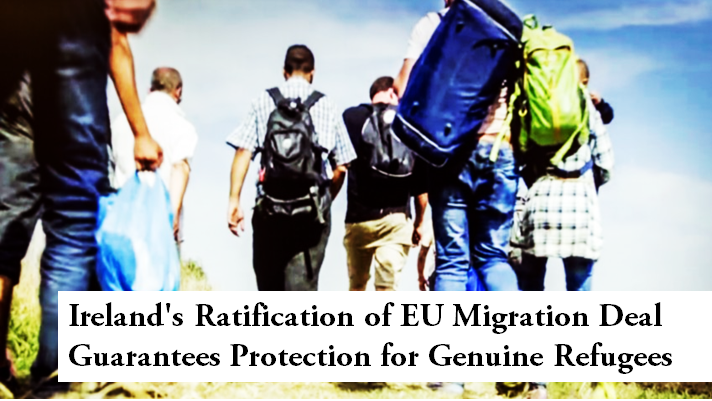Dublin: Overcoming significant opposition, the Irish Dáil has approved the European Union’s migration agreement. After two weeks of intense discussions and debates, the Asylum and Migration Agreement was passed with a vote of 79 to 72 in favour.
The government argued that Ireland cannot tackle the increasing issue of illegal immigration on its own and should collaborate with the EU to address the problem. This stance was supported by the majority of the parliament, despite strong opposition from parties including Sinn Féin.
In March, Justice Minister Helen McEntee announced her support for the deal, which will introduce legal procedures and timelines for international protection applicants. The agreement includes measures such as increasing staff to handle applications, constructing new accommodation centres, enhancing border security, and implementing fingerprint collection.
However, there was widespread criticism from the opposition. Sinn Féin and others argued that many provisions of the agreement were detrimental to Ireland’s interests and could pose significant challenges for future governments. Sinn Féin also accused the deal of potentially causing a major crisis down the line.
Justice Minister McEntee defended the agreement, stating it was the best way for Ireland and Europe to collaborate on migration issues. She welcomed the Dáil’s approval and noted that while the agreement would take time to implement, changes aligning with its provisions have already been introduced into Ireland’s system.
The government highlighted that the agreement allows for the protection of asylum seekers while enabling the immediate return of those not eligible.
Understanding the New EU Migration Deal
Ireland has ratified the EU’s new migration agreement, which aims to assist those in need of protection and attract skilled migrants to contribute to Europe’s sustainable growth. This comes in response to the sudden influx of refugees from Ukraine and other regions, highlighting Ireland’s accommodation challenges.
The 2015–2016 refugee crisis exposed flaws in the EU’s immigration system. The situation worsened in 2022 with the influx of Ukrainian refugees following Russia’s invasion. In April 2024, the European Parliament approved the new agreement, which each member state must implement by December 2024, with the rules coming into force in 2026.
From CEAS to AMMR
The new agreement revises the Common European Asylum System (CEAS), established in 1999, which faced limitations due to the Dublin Regulation. This regulation made the country of first arrival responsible for refugees, which includes geographically disadvantaged countries like Ireland.
The Asylum and Migration Management Regulation (AMMR) will replace the Dublin Regulation, setting new country-by-country standards to prevent asylum application abuse. The new agreement includes a solidarity mechanism where member states can share the responsibility for refugees or transfer them to willing states, with financial assistance from the EU’s common fund.
Benefits of the Agreement
The agreement aims to build trust among member states through expedited procedures and strengthened border controls. It provides support for countries facing migration crises and includes provisions to attract global talent and reduce illegal immigration. Partnerships with key countries are expected to prevent illegal immigration, ensuring swift and effective responses to migration crises.
The government emphasised that the agreement would benefit immigrants and member states alike by creating a more organised and supportive system for handling migration challenges.
Irish Samachar English News
{OR} Kindly click to follow the Irish Samachar News channel on WhatsApp

